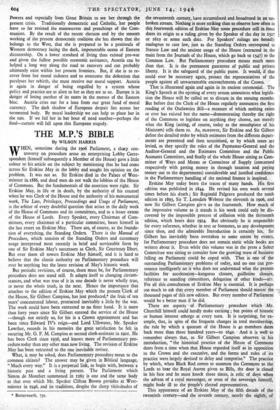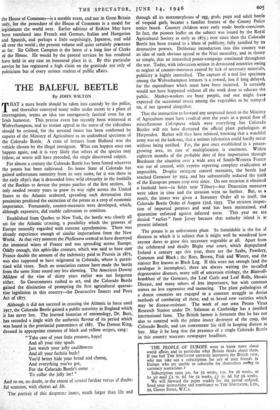THE M.P.'S BIBLE
By WILSON HARRIS
WHEN, sometime during the 1906 Parliament, a sharp con- troversy on procedure arose an enterprising Lobby Corre- spondent (himself subsequently a Member of the House) gave a little colour to his article on the subject by mentioning that he had come across Sir Erskine May in the lobby and sought his opinion on the problem. It was not so. Sir Erskine died in the Palace of West- minster in 1886, and dead men do not walk the lobbies of the House of Commons. But the fundamentals of the assertion were right. Sir Erskine May, in life or in death, by the authority of his counsel whenle was Clerk of the House and the authority of his monumental work, The Law, Privileges, Proceedings and Usage of Parliament, is the arbiter of every doubtful question that arises in the daily work Of the House of Commons and its committees, and to a lesser extent of the House of Lords. Every Speaker, every Chairman of Com- mittees, every chairman of a particular committee, bases himself in the last resort on Erskine May. There are, of course, as the founda- tion of everything, the Standing Orders. There is the Manual of Procedure, which consists of the Standing Orders and customary usage interpreted most recently in brief and serviceable form by one of Sir Erskine May's successors as Clerk, Sir Courtenay Ilbert. But over them all towers Erskine May himself, and it is hard to believe that the classic authority on Parliamentary procedure will ever be anything but the latest revision of May's historic work.
But periodic revisions, of course, there must be, for Parliamentary procedure does not stand still. It adapts itself to changing circum- stances, and what was true of it in one decade is never wholly true, or never the whole truth, in the next. Hence the importance that attaches to the edition of Erskine May which the present Clerk of the House, Sir Gilbert Campion, has just produced,* the fruit of ten years' concentrated labour, protracted inevitably a little by the war. The work could have been entrusted to no fitter hand. It is more than forty years since Sir Gilbert entered the service of the House —though not strictly so, for his is a Crown appointment and has been since Edward IV's reign—and Lord Ullswater, Mr. Speaker Lowther, records in his memoirs the great satisfaction he felt in securing Mr. G. F. M. Campion as second clerk-assistant in 1921. He has been Clerk since 1936, and knows more of Parliamentary pro- cedure today than any other man now living. The revision of Erskine May has been entrusted to the one inevitable reviser.
What, it may be asked, does Parliamentary procedure mean to the common citizen? The answer may be ,given in Biblical language, " Much every way." It is a perpetual link, to begin with, between a historic past and a living present. The Parliament which Simon de Montfort summoned in 1265 is one and the same body as that over which Mr. Speaker Clifton Brown presides at West- minster in 1946, and its traditions, despite the sharp vicissitudes of * Butterworth, 75s. the seventeenth century, have accumulated and. broadened in an un- broken stream. Nothing is more striking than to observe how often in this fourteenth edition of Erskine May some procedure still in force dates its origin to a ruling given by the Speaker of the day in 1527 or 1610 or some such date. For Speakers' rulings are broadly analogous to case law, just as the Standing Orders correspond to Statute Law and the ancient usage of the House (extracted in the main from the Journals of the House, which go back to 1547) to the Common Law. But Parliamentary procedure means much more than that. It is the permanent guarantee of public and private liberty. It is the safeguard of the public purse. It would, if that could ever be necessary again, protect the representatives of the people against all unwarrantable encroachments of the Crown.
That is illustrated again and again in its ancient ceremonial. The King's Speech at the opening of every sesson announces what legisla- tion the House will be called on to discuss in the ensuing months.
But before that the Clerk of the House regularly announces the first reading of the Outlawries Bill—a measure of which nothing exists or ever has existed but the name—demonstrating thereby the right of the Commons to legislate on anything they choose, not merely what the King (acting, of course, today as the mouthpiece of his Ministers) tells them to. As, moreover, Sir Erskine and. Sir Gilbert define the detailed order by which estimates from the different depart- ments are presented and then scrutinised, or by which taxes are levied, as they specify the roles of the Paymaster-General and the Auditor-General and the Estimates Committee and the Public Accounts Committee, and finally of the whole House sitting as Com- mittee of Ways and Means or Committee of Supply (concerned respectively with getting money in through taxation and paying money out to the departments) considerable and justified confidence in the Parliamentary handling of the national finance is inspired.
Erskine May today bears the traces of many hands. His first edition was published in 1844. He revised his own work several times before his death ; Sir Reginald Palgrave produced the tenth edition in 1893, Sir T. Lonsdale Webster the eleventh in 1906, and now Sir Gilbert Campion giv2s us the fourteenth. How much of the impressive volume as it stands is his work could only be dis- covered by the impossible process of collation with the thirteenth edition, which bears date 1924. But obviously he is responsible for every reference, whether in text or footnotes, to any development since then, and the admirable Introduction is certainly his. Sir Gilbert has inevitably been overtaken to some extent by events, for Parliamentary procedure does not remain static while books are written about it. Even while this volume was in the press a Select Committee was sitting to consider how the groWing mass of business falling on Parliament could be coped with. That is one of the outstanding Parliamentary problems of today, and no one can pro- nounce intelligently on it who does not understand what the present facilities for acceleration—kangaroo closure, guillotine closure, reference to standing committees, delegation of other kinds—are. For all this .consultation of Erskine May is essential. It is perhaps too much to ask that every member of Parliament should master the thousand pages of this new edition. But every Member of Parliament would be a better man if he did.
There are aspects of Parliamentary procedure which Mr. Churchill himself could hardly make exciting ; but points of historic or human interest emerge at every turn. It is surprising, for ex- ample, that, in spite of the frequent changes in total membership, the rule by which a quorum of the House is 4o members dates back more than three hundred years—to 164o. And it is well to remember always that, as Sir Gilbert Campion observes in his introduction, " the historical practice of the House of Commons dates from a time when that House regarded itself as in opposition to the Crown and the executive, and the forms and rules of its practice were largely devised to delay and temporise." The practice by which, when Black Rod comes to summon the Commons to the Lords to hear the Royal Assent given to Bills, the door is closed in his face and he must knock three times, is relic of days when the advent of a royal messenger, or even of the sovereign himself, might bode ill to the people's elected representatives.
This appearance of an Erskine May of the fifth decade of the twentieth century—and the seventh century, nearly the eighths of
the House of Commons—is a notable event, and not in Great Britain only, for the procedure of the House of Commons is a model for legislatures the world over. Earlier editions of Erskine May have been translated into French and German, Italian and Hungarian and Spanish, and perhaps a little surprisingly, Japanese, and sold all over the world ; the present volume will quite certainly penetrate as far. Sir Gilbert Campion is the latest of a long line of Clerks of the House. He would by the general services he has rendered have held in any case an honoured place in it. By this particular service he has registered a high claim on the gratitude not only of politicians but of every serious student of public affairs.































 Previous page
Previous page